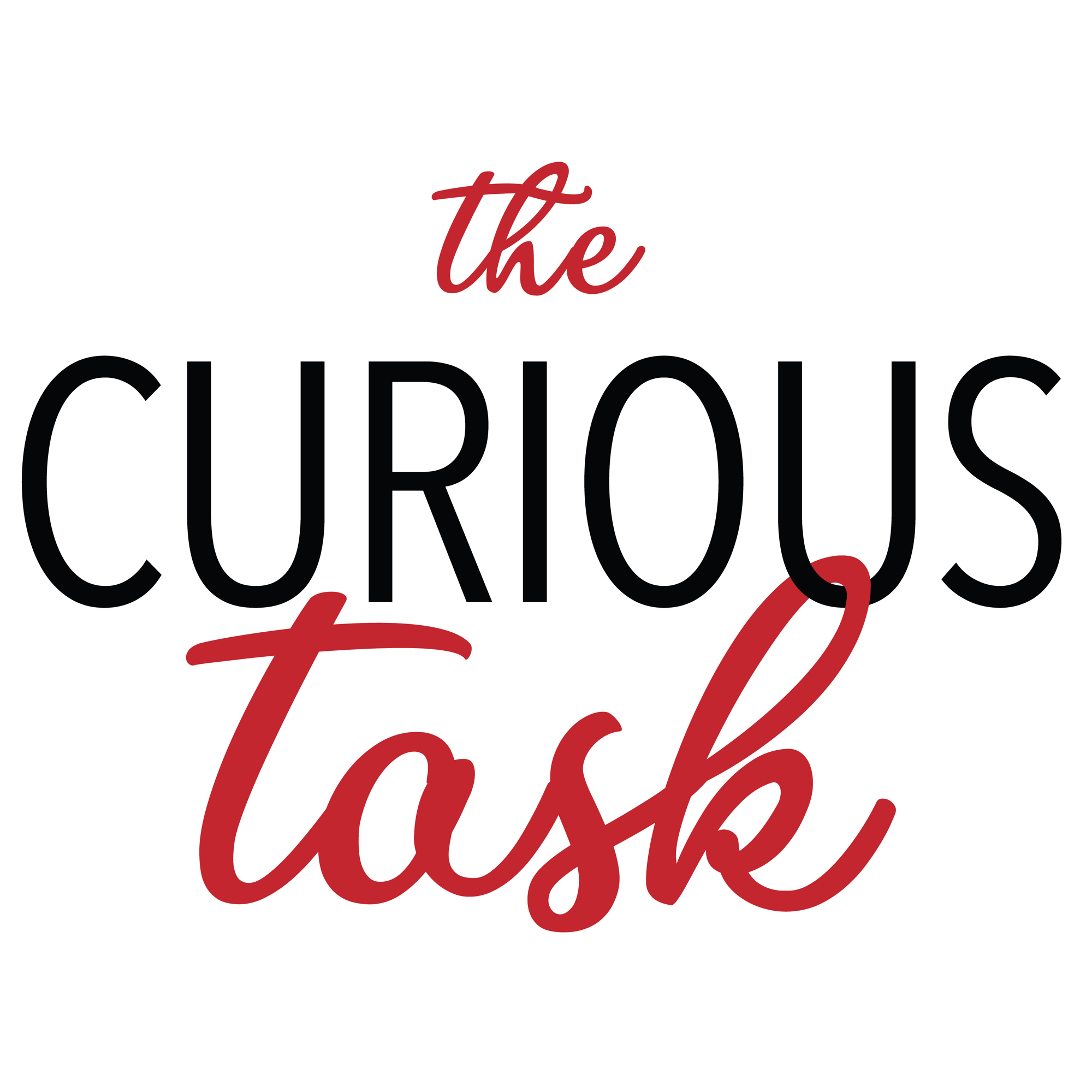Episodes
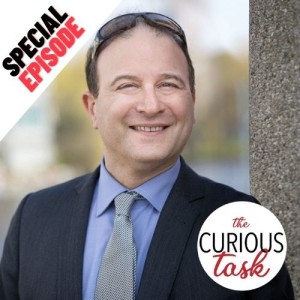
Wednesday Jul 28, 2021
Eric Schliesser — What Is Neoliberalism?
Wednesday Jul 28, 2021
Wednesday Jul 28, 2021
In Special Episode 2's celebration of 100 episodes, Curious Task host Alex Aragona pointed to Episode 60 with Eric Schliesser as one of his favourites, so we're re-releasing it! In this episode, Alex Aragona speaks with Eric Schliesser as he explores the history of the term "neoliberalism," its eventual evolution, and what neoliberalism means today. If you haven't had a chance to listen to it before, we hope you find it interesting. If you have, enjoy its re-release!
References from The Curious Task Special Episode 5 with Eric Schliesser
- Here is a list of Eric Schliesser’s publications.
- Dr. Karen Horn and Dr. Stefan Kolev’s joint work, entitled Economic Thinking, has a German version available for purchase on Amazon Canada at this link.
- Walter Lippmann’s book, The Good Society, which went on to become an international hit as for “its insight of neoliberalism as the intellectual status quo in the 19th century” can be purchased on Amazon Canada at this link.
- Marxist Scholar David Harvey’s book, A Brief History of Neoliberalism, where he equated neoliberalism “to everything he hated about capitalism” is available on Amazon Canada at this link.
- Mishel Foucault’s lecture series where he traced the history of neoliberalism from the eighteenth to twentieth centuries was published as The Birth of Biopolitics, which can be purchased on Amazon Canada at this link.
- Mark Buchanan’s article Wealth Happens analyzes the the “butchers and bakers” quote that was mentioned in passing by Alex Aragona at this online publishing from The Harvard Business Review.
- Milton Friedman’s article, Laws That Do Harm, is available for viewing at the Center of the American Experiment’s blog, which features the quote to “judge public policies by their results, not their intentions.”
- According to Eric Schliesser, the harm principle is a core liberal value and can be extended to markets. You can read about the Stanford Encyclopedia of Philosophy’s lesson on John Stuart Mill’s version of the harm principle (Chapter 3.6) here.
- You can read Milton Friedman’s The Basic Principles of Liberalism here.
- You can watch Milton Friedman speak about the enemies of markets on the American Enterprise Institute’s website at this link.
- The Elgar Companian to the Chicago School of Economics can be purchased directly from the publishers here.
- Alex Aragona quotes this blogpost, How ‘Neoliberalism’ came to refer to Everything I reject from Digressions&Impressions.
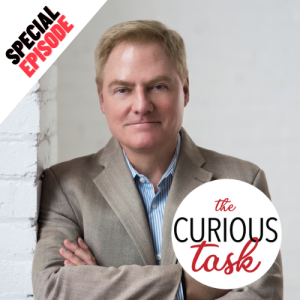
Wednesday Jul 21, 2021
Tom Palmer — War, What Is It Good For?
Wednesday Jul 21, 2021
Wednesday Jul 21, 2021
In Special Episode 2's celebration of 100 episodes, Curious Task producer Sabine El-Chidiac pointed to Episode 67 with Tom Palmer as one of her favourites, so we're re-releasing it! In this episode, Tom Palmer talks about the institutions and conditions that cause peace and war, and why the concept of war might be closer to home than some might think. If you haven't had a chance to listen to it before, we hope you find it interesting. If you have, enjoy its re-release!
References from The Curious Task Special Episode 4 with Tom Palmer
- Tom Palmer’s book, Realizing Freedom: Libertarian Theory, History, and Practice can be purchased on Amazon Canada at this link.
- Tom has additionally wrote and/or edited the following works:
The Morality of Capitalism: What Your Professors Won't Tell You (link)
After the Welfare State (link)
Why Liberty (link)
Self-Control or State Control? You Decide (link)
Peace, Love, and Liberty - the basis of this episode from which many of quotes, interview references, and military case studies were selected (link)
Dignity and Democracy with co-author Matt Warner (publication coming out next year) - Erik Gartzke found that trading countries are less likely to war in his article, The Capitalist Peace, which is available online.
- Tom’s Interview with a Businessman for Peace with Chris Rufer on peacemaking in business and trade, appears in Chapter 4 of Peace, Love, and Liberty.
- Frédéric Bastiat’s was an economist and peace advocate who argued the costs of long-term consumption from tax-produced weaponry in his book, That Which Is Seen, and That Which Is Not Seen, which can be read on the Mises Institute’s website.
- Robert Higgs’ article, Wartime Prosperity? A Reassessment of the U.S. Economy in the 1940s, (featured in The Journal of Economic History) clarified how productive efforts in jeeps and vans shipped to other countries do not constitute economic benefit due to the lack of private vehicle production. This article can be accessed here through an active JSTOR account or your educational institution.
- Tom’s essay, Peace is a Choice, presents a case study on political science professor and former US government official Madeline Albright and her view of the exemplary nation and how professors have a tendency to think about wars differently than those who have witnessed them. This is a chapter in Peace, Love, and Liberty.
- A transcript of Colin Powell’s infamous 2003 speech to the United Nations on the disarmament of Iraq which touches on themes of human lives and consequence can be read on The Washington Post archives.
- Tom’s recommended two German novels of the Great War to enrich an understanding of war from different perspectives on anguish and glory, respectively: All Quiet on the Western Front by Erich M. Remarque (link) and Storm of Steel by Ernst Junger (link).
- Parker Thomas Moon’s book, Imperialism and World Politics, highlights the devaluation of important political science questions when personal pronouns are employed during conflict. This book is available on Google Books at this link.
- Joshua Greene’s book discussing our psychological propensities to cooperate and designate teams to destroy other groups, Moral Tribes: Emotion, Reason, and the Gap Between Us and Them is available on Amazon Canada for purchase here.
- Robert Musil’s book, The Man Without Qualities, explores how a nation exists to offset responsibilities without remorse and is available for purchase on Amazon at this link.
- Samuel P. Huntington’s study, The Clash of Civilizations?, noting how much territory is under military control can be viewed at this link through an active JSTOR or partner institution account.
- Tom cites Carl Schmitt and his theory on the irreconcilibity of conflicts as a foundation for solidarity in the podcast. An overview of Schmitt’s essential works was published by John P. McCormick from the University of Chicago in the Annual Review of Political Science at this link.
- Chapter Five of Aristotle’s Nicomachean Ethics, covering the types of friendships human beings can have, was briefly mentioned on the podcast and can be read at this link courtesy of McMaster University’s Faculty of Social Sciences.
- Ernesto Laclau emphasizes the importance of identifying the enemy for successful populist rhetoric in his book, On Populist Reason, available on Amazon Canada here.
- George Orwell’s essay on how language can be operationalized to “obscure pure violence,” Politics and the English Language, can be accessed online at this link.
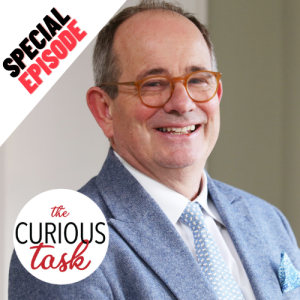
Wednesday Jul 14, 2021
James Tooley — Is Low-Cost Private Education Possible?
Wednesday Jul 14, 2021
Wednesday Jul 14, 2021
In Special Episode 2, Matt Bufton pointed to The Curious Task Episode 77 with James Tooley as one of his favourites. If you haven't had a chance to listen to it before, we hope you find it interesting. If you have, enjoy its re-release!
References from The Curious Task Special Episode 3 with James Tooley
- The E. G. West Centre at Newcastle University is the namesake of economist E. G. West. This page will direct listeners to his various articles and reports.
- James’ book, The Beautiful Tree: A Personal Journey Into How the World’s Poorest People are Educating Themselves is the basis of today’s discussion and can be purchased from Amazon Canada here.
- You can read more about the John Templeton Foundation’s work at this link.
- Here is a link to James’ case study research about for-profit private education in India.
- This is The Economist article about Indian private schools educating 50% of the population that James mentions briefly on the podcast.
- Here is a synopsis of The Elementary Education Act of 1870 which mandated public education for schoolchildren between five to thirteen years of age. James’ book with the Independent Institute, Really Good Schools can be purchased here.
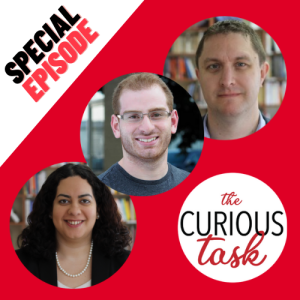
Monday Jul 12, 2021
Celebrating 100 Episodes
Monday Jul 12, 2021
Monday Jul 12, 2021
To celebrate reaching 100 episodes, host Alex Aragona, producer Sabine El-Chidiac, and executive producer Matt Bufton look back on the origins and growth of the podcast, some of their favourite episodes, and so much more in this very special bonus episode.
References from The Curious Task Special Episode 2 with Matt Bufton, Sabine El-Chidiac and Alex Aragona
- You can listen to Graeme Thompson discuss Canadian Liberalism here. Dennis Rasmussen discusses if America failed here.
- The very first episode of The Curious Task with Nigel Ashford can be listened to here.
- Alex Salter talks about central banking on The Curious Task here.
- Matt mentions that two of his favourite episodes on The Curious Task are Mustafa Akyol on freedom in the Muslim world here, and James Tooley on private education here.
- The Beautiful Tree by James Tooley can be purchased from Amazon here.
- Sabine mentions that two of her favourite episodes on The Curious Task are Tom Palmer on what is war good for here, and Jacob Levy on civil society here.
- Rationalism, Pluralism, and Freedom by Jacob Levy can be purchased from Amazon here.
- Alex mentions that two of his favourite episodes on The Curious Task are Aeon Skoble on anarchy here, and Eric Schliesser on neoliberalism here.
- You can learn more about our Patreon here.
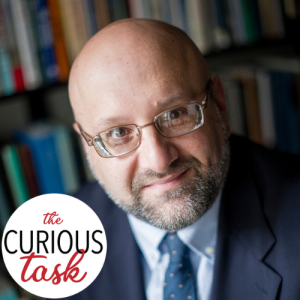
Wednesday Jul 07, 2021
Steve Horwitz — What Drives Progress?
Wednesday Jul 07, 2021
Wednesday Jul 07, 2021
In honour of Steve Horwitz (1964-2021), we are re-releasing his conversation with Alex Aragona on what drives progress — a topic near and dear to Steve's heart.
References from The Curious Task Special Episode 1 with Steve Horwitz
- Steve Horwitz is the author of Austrian Economics: An Introduction; Microfoundations and Macroeconomics: An Austrian Perspective; Monetary Evolution, Free Banking, and Economic Order; and Hayek’s Modern Family: Classical Liberalism and the Evolution of Social Institutions which are available for purchase on Amazon Canada (titles hyperlinked).
- This article entitled Persistent Fallacies by Vuk Vukovic recounts the misconceptions surrounding growth and is a response to the book, Why Nations Fail, featuring an anecdote on Paul Samuelson’s forecast of the USSR overtaking the US economy that was referenced by Steve in the episode.
- In case you missed Virginia Postrel’s episode on The Curious Task and wish to catch up with her research, her book, The Fabric of Civilization: How Textiles Made the World, can be purchased on Amazon Canada at this link.
- The Cato Institute published an article by Adam D. Thierer on permissionless innovation, which also provides an overview of Deidre McCloskey’s contributions to the theory. It can be read here.
- You can read Steve’s article, Privilege and the Liberal Tradition, on libertarianism.org.
- Here is an excerpt on Ludwig’s von Mises’ concept of peaceful transference from his book, Liberalism: In the Classical Tradition.
- You can learn more about Robert Higgs’ concept of regime uncertainty through this downloadable PDF published by the Independent Institute.
- This article by Gerald P. O’Driscoll, Jr. is an introduction to “sound money” that Steve also talks about during the podcast.
- You can watch Hans Rosling’s TED video on The Magic Washing Machine at this link.
- The joint research on inequality published by Steve and Vincent Geloso is available for reading here.
- Here is the article written by Steve on Tyler Cowen’s joint article on The Great Stagnation, which is also available for reading online at this link.
- Here is some more background on precision medicine that Steve mentions briefly on the podcast.
- Here is the link to the 2007 panel discussion with Steve Jobs and Bill Gates that Alex mentions in the podcast.
- The Back to the Future trilogy and Demolition Man can be purchased and/or streamed from Amazon Canada. You can read more about John Stuart Mill’s “experiments of living” at the Stanford Encyclopedia of Philosophy’s website (Chapter 4.6).
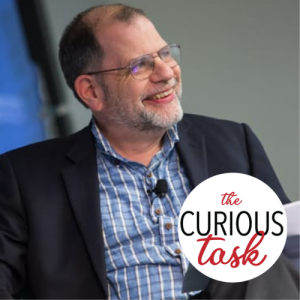
Wednesday Jun 30, 2021
Tyler Cowen — Is Scarborough The Dining Capital of the World?
Wednesday Jun 30, 2021
Wednesday Jun 30, 2021
Tyler Cowen chats with Alex Aragona about all things food — great things to eat, where to find them, and how an economist gets lunch.
References from The Curious Task Episode 100 with Tyler Cowen
- You can purchase An Economist Gets Lunch by Tyler Cowen from Amazon here.
- You can read more from Tyler Cowen at the blog Marginal Revolution here. Find their course materials at Marginal Revolution University here.
- Tyler Cowen also has a food blog here.
- Read more about locavorism in The Locavore's Dilemma by Pierre Desrochers and Hiroko Shimizu, available through Amazon here.
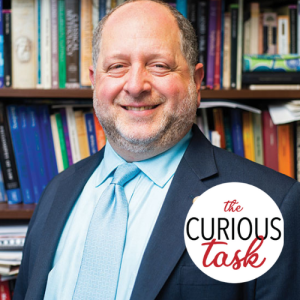
Wednesday Jun 23, 2021
Aeon Skoble — Is Anarchy Relevant For Classical Liberalism?
Wednesday Jun 23, 2021
Wednesday Jun 23, 2021
Alex Aragona peaks with Aeon Skoble as he outlines his ideas on what anarchism is, how we should think on it, and how it overlaps with classical liberal ideas.
References from The Curious Task Episode 99 with Aeon Skoble
- Aeon Skoble is author of Deleting the State and editor of a collection of essays called The Simpsons and Philosophy. He has a chapter titled “What Is the Point of Anarchism” in The Routledge Handbook of Anarchy and Anarchist Thought. Read more from Aeon Skoble on the blog Radical Classical Liberal here.
- Aeon Skoble mentions Robert Nozick, who argues for a minimal state in Anarchy, State, and Utopia available for purchase here. Aeon Skoble further discusses Robert Nozick in this video produced by the Fraser Institute here.
- Learn more about the prisoner’s dilemma here.
- The relationship between anarchism and law is explored by Bruce Benson in his book The Enterprise of Law, available for purchase here.

Wednesday Jun 16, 2021
Janet Bufton and Sarah Skwire — Why Tweet The Wealth of Nations?
Wednesday Jun 16, 2021
Wednesday Jun 16, 2021
Alex Aragona speaks with SmithTweeters Janet Bufton and Sarah Skwire as they describe what drew them to the idea of reading through all of The Wealth of Nations and providing an ongoing commentary on Twitter, and how Adam Smith's ideas remain relevant.
References from The Curious Task Episode 98 with Janet Bufton and Sarah Skwire
- Janet Bufton previously spoke on The Curious Task, which you can listen to here. Sarah Skwire has also appeared on The Curious Task here.
- You can read the #WealthofTweets here.
- The digression on silver in the Wealth of Nations can be read online here.
- Previous Smith Questionnaires can be watched on YouTube here.
- Learn more about the works of Adam Smith from Adam Smith Works here.
- Sarah and Janet reflect on their experience with the #WealthofTweets here.
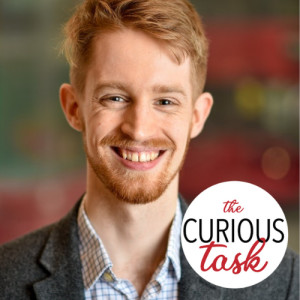
Wednesday Jun 09, 2021
Anton Howes — What Powered Innovation In Britain?
Wednesday Jun 09, 2021
Wednesday Jun 09, 2021
Alex Aragona speaks with Anton Howes about when the sparks of innovation started in Britain, and what fanned the flames moving forward.
References from The Curious Task Episode 97 with Anton Howes
- You can read more about the Age of Invention at the substack where Anton Howes writes about his ideas here. You can also find his working paper titled The Spread of Improvement here.
- Deirdre McCloskey details her arguments about ethics and commerce in her series which begins with Bourgeois Virtues, available for purchase from Amazon here.
- The European Guilds by Sheilagh Ogilvie is available for purchase through Princeton Press here.
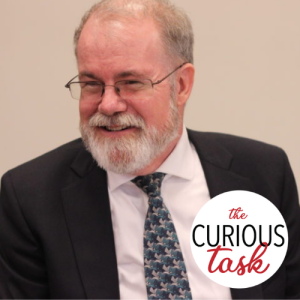
Wednesday Jun 02, 2021
Bill Easterly — What Is The Tyranny of Experts?
Wednesday Jun 02, 2021
Wednesday Jun 02, 2021
Bill Easterly tours some of the concepts from his book The Tyranny of Experts, and explores why technocrats imposing their own form of economic development on cultures and peoples can produce more harm than good.
References from The Curious Task Episode 96 with Bill Easterly
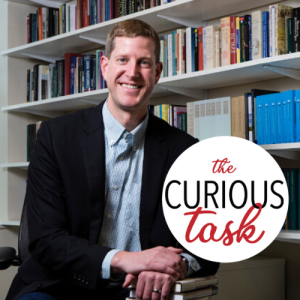
Wednesday May 26, 2021
Dennis Rasmussen — Did America Fail?
Wednesday May 26, 2021
Wednesday May 26, 2021
Alex Aragona speaks with Dennis Rasmussen about his findings on how the American Founding Fathers truly felt about the experiment they designed and built as time went on.
References from The Curious Task Episode 95 with Dennis Rasmussen
- Dennis Rasmussen previously joined The Curious Task to speak about his book The Infidel and the Professor, and you can listen to that episode here.
- The book discussed on this episode of The Curious Task is Fears of the Setting Sun by Dennis Rasmussen, which can be purchased from Amazon here.
- The rising sun armchair can be seen digitally here.
- More information on the Federalists can be found here, and the Anti-Federalists here.
- The soundtrack to Hamilton can be listened to here.
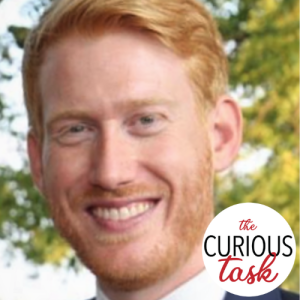
Wednesday May 19, 2021
Graeme Thompson — What Is Canadian Liberalism?
Wednesday May 19, 2021
Wednesday May 19, 2021
Alex Aragona speaks with Graeme Thompson about the classical liberal tradition in Canada, and what the evolution of that tradition has looked like.
References from The Curious Task Episode 94 with Graeme Thompson
- A collection of the speeches of Wilfred Laurier can be found in an edited edition by Arthur Milnes, available from Amazon here.
- Macdonald Laurier and the Election of 1891 by Christopher Pennington can be found from Penguin House here.
- Graeme Thompson’s piece “Whatever Happened to Laurier” can be found in the National Post here.
- Graeme mentions positive and negative liberty by Isaiah Berlin, which is discussed on the Stanford Encyclopedia of Philosophy here.
- The works of Adam Smith, Edmund Burke, and J.S. Mill can be read for free through the Online Library of Liberty.
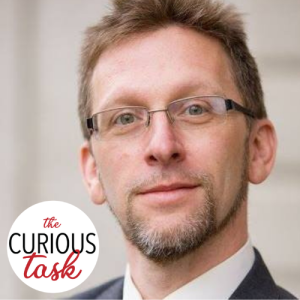
Tuesday May 18, 2021
Jacob Levy — How Should Liberals Think of Social Injustice?
Tuesday May 18, 2021
Tuesday May 18, 2021
Jacob Levy gives a tour of his thoughts on the conversations surrounding social justice, and how liberals might consider the topic from the perspective of social "injustice".
References from The Curious Task Episode 93 with Jacob Levy
- You can listen to Jacob Levy’s other appearances on The Curious Task here and here.
- Rationalism, Pluralism, and Freedom by Jacob T. Levy can be purchased from Amazon here.
- You can purchase Free Market Fairness by John Tomasi from Amazon here.
- You can read more concepts of spontaneous and emergent order found in Hayek here.
- Judith Shklar lays out her argument about injustice in her book The Faces of Injustice (which can be purchased here).
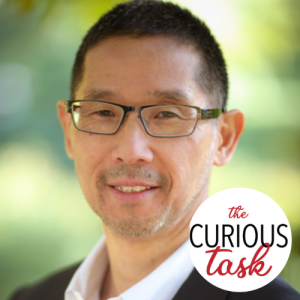
Wednesday May 05, 2021
Sandy Ikeda — What Would Jane Jacobs Do?
Wednesday May 05, 2021
Wednesday May 05, 2021
In honour of her birthday, Sandy Ikeda explores the ideas of Jane Jacobs and reflects on how her thinking on urban centres is still relevant today.
References from The Curious Task Episode 92 with Sandy Ikeda
- You can listen to Sandy Ikeda discuss “Why Can’t a City Be a Work of Art?” on The Curious Task here.
- A copy of Jane Jacob’s Death and Life of Great American Cities can be purchased from Amazon here. Some of her other works include The Economy of Cities (available here) and Systems of Survival (available here).
- For those who want to learn more about Austrian economics, our friends at the Frasier Institute have released an introduction to the subject here.
- You can read more about the thoughts Sandy Ikeda has on Urban Design and Social Complexity here.
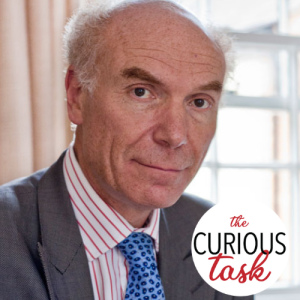
Wednesday Apr 28, 2021
Terence Kealey — Should Government Fund Science?
Wednesday Apr 28, 2021
Wednesday Apr 28, 2021
Terence Kealey speaks about the history of state involvement in funding science and technology, and why it may not be as good or innovative of an idea as it may seem.
References from The Curious Task Episode 91 with Terence Kealey
- You can purchase a copy of Sex Science and Profits by Terence Kealey on Amazon here.
- The story of Katalin Karikó is explored in detail in this article.
- Terence Kealey has a chapter in Visions of Liberty, available for purchase here.
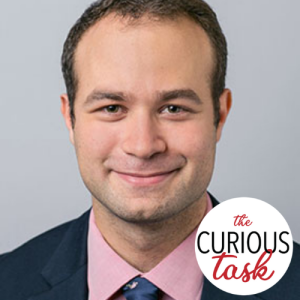
Wednesday Apr 21, 2021
Nick Cowen — Should We Regulate Online Sex Work?
Wednesday Apr 21, 2021
Wednesday Apr 21, 2021
Alex Aragona speaks with Nick Cowen as he explores the current state of sex work regulation, and what approaches regulators could (and should) take when considering the increasing online landscape for these services.
References from The Curious Task Episode 90 with Nick Cowen
- Nick Cowen is the author of Neoliberal Social Justice. You can read the first chapter of his book here.
- Nick Cowen’s article Sex Work and Online Platforms: What Should Regulation Do? can be downloaded and read here. Within the article, the section which specifically explores the various models of sex work regulation begins on page 5.
- Markets without Limits by Peter Jaworski and Jason Brennan can be found here.
- Michael Munger speaks more about transaction costs in the economy with our friends at Econtalk here.
- An explanation of the key debates currently about sex work can be found by following this link.
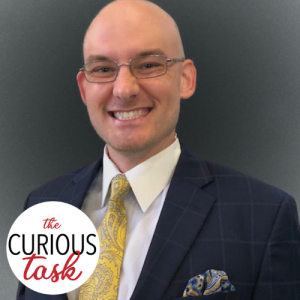
Wednesday Apr 14, 2021
Alex Salter — Did Central Banks Get COVID-19 Right?
Wednesday Apr 14, 2021
Wednesday Apr 14, 2021
Alex Salter dives into Federal Reserve policies during the pandemic, what it got right and wrong, and what the lasting impacts will be.
References from The Curious Task Episode 89 with Alex Salter
- Alex Salter is the co-author of Money and the Rule of Law along with Peter Boettke and Daniel Smith. His book can be purchased from Amazon here.
- To read more about the Federal Reserve’s actions during the financial crisis from Vice Chairman of the Federal Reserve Donald Kohn, see here.
- Alex Salter’s most recent commentary on the Federal Reserve at AIER can be found here and here.
- Alex Salter discusses the Federal Reserves response to COVID-19 here.
- For more information about the accountability and transparency of the federal reserve, see the report from Scott Sumner at the Mercatus Center found here.
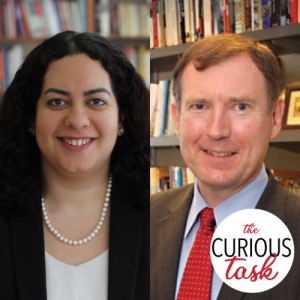
Wednesday Apr 07, 2021
Wednesday Apr 07, 2021
Dan and Sabine discuss their newest policy brief with the Mercatus Center, and what changes they'd like to see to Canadian and American immigration policy as it relates to movement between the two countries.
References from The Curious Task Episode 88 with Dan Griswold & Sabine El-Chidiac
- The policy brief co-authored by Daniel Griswold and Sabine El-Chidiac titled “Deepen Us-Canada Ties with a Post-COVID-19 Agreement for the Free Movement of People can be found here.
- Dan Griswold’s book Mad About Trade: Why Main Street America Should Embrace Globalization can be purchased on Amazon here.
- For more information on Canadian Immigrants in the United States, see this information from the Migration Policy Institute here.
- Dan Griswold explains his stance on Employment-Based Immigration Policies found in Australia and Canada in an interview with the Washington Journal here.
- Find Free to Move: Foot Voting, Migration and Political Freedom by Ilya Somin available for purchase here. Ilya Somin also appeared on the Curious Task to speak about voting with your feet here.
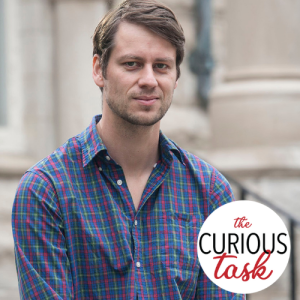
Wednesday Mar 31, 2021
Bas van der Vossen — Who Owns Your Labour?
Wednesday Mar 31, 2021
Wednesday Mar 31, 2021
Alex Aragona explores standard readings of Lockean property rights theories with Bas van der Vossen, and then explore Bas' idea on what might be missing from these traditional understandings and interpretations.
References from The Curious Task Episode 87 with Bas van der Vossen
- Bas van der Vossen explores the historical entitlement theory, including some of the points he included in his presentation about Robert Nozick’s version during the podcast, at this link.
- You can read John Locke’s Second Treatise of Government online at this link. Chapter 5, On Property, forms the basis of much of this week’s discussion,
- This article titled, John Locke: Some Problems in Locke’s Theory of Private Property, on libertarianism.org features Nozick’s famous tomato juice analogy that objects Locke’s principle of labour mixing, and is also an extension of the discussion brought up by Bas during this episode.
- Here is an excerpt by Bas van der Vosen on Hume’s idea of property rights as convention.
- You can access Bas van der Vossen’s work on the “Enough and As Good” Lockean proviso here.
- Here is a paper by Hillsdale College on the appropriative water rights doctrine in the Western United States that Bas briefly mentions during the podcast.
- Bas mentions the water shortages that California faces from waterway droughts. An article that details the “Tahoe to tap” option can be accessed at this link.
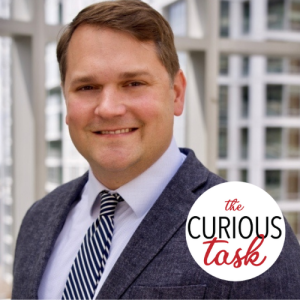
Wednesday Mar 24, 2021
Matt Warner — What's Wrong With Foreign Aid?
Wednesday Mar 24, 2021
Wednesday Mar 24, 2021
Alex Aragona speaks with Matt Warner as he explores the dilemma that outsiders face when trying to do good for others, and why local knowledge is so important.
References from Episode 86 with Matt Warner
- Matt Warner is the author of, Poverty and Freedom: Case Studies on Global Economic Freedom, which can be purchased from Amazon Canada here.
- Eric Beinhocker’s book, The Origin of Wealth, was mentioned by Matt because it makes a Hayekian case for use of knowledge in society and that there is more than one type of knowledge in an array of complex adaptive systems. This book can also be purchased on Amazon Canada at this link.
- Matt mentions Jeffrey Sachs’ crop yield project in Uganda during the podcast. You can read some of Sachs’ work for the Africa Growth Initiative here.
- Francis Fukuyama’s book, The End of History, can be purchased from Amazon Canada at this link.
- Stephen Holmes co-authored the book, The Light That Failed, with Ivan Krastev, which is also available for purchase on Amazon Canada here.
- Why Nations Fail is another book cited by Matt during the podcast. It was co-authored by James Robinson and is available on Amazon Canada here.
- You can read Mohamed Bouazizi’s story and how it ignited the Arab Spring here.
- Mauricio Miller’s book, The Alternative, is listed on Amazon Canada at this link.
- Amartya Sen’s book, Development as Freedom, can be found on Amazon Canada here.
- You can explore Jeremy Shapiro’s work on development economics on his website.
- Samantha Power’s memoir, The Education of an Idealist, is available for purchase on Amazon Canada at this link.
- Daron Acemoglu and James Robinsson’s book, The Narrow Corridor, was also mentioned by Matt during the podcast and can be purchased here.
- You can read Freedom House’s report on the state of democracy around the world in 2021 here.

